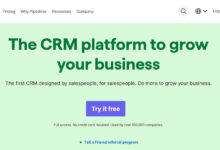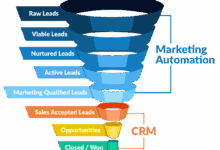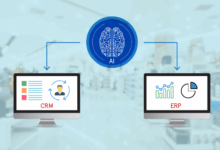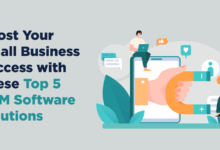Top Cloud-Based CRM Platforms
Top Cloud-Based CRM Platforms are revolutionizing how businesses manage customer relationships. This shift towards cloud-based solutions offers unparalleled flexibility, scalability, and cost-effectiveness compared to traditional on-premise systems. From streamlined sales processes to enhanced customer insights, cloud CRMs empower businesses of all sizes to optimize their operations and drive growth. This exploration delves into the key features, leading platforms, and crucial considerations for successful implementation.
We will examine various deployment models, explore essential features like contact management and sales automation, and compare leading platforms based on pricing, target audience, and unique selling propositions. The guide also covers crucial aspects such as data security, integration with existing systems, and future trends shaping the cloud CRM landscape. Understanding these elements is critical for selecting and implementing the right platform to meet specific business needs.
Introduction to Cloud-Based CRM Platforms
Cloud-based Customer Relationship Management (CRM) platforms represent a significant shift in how businesses manage their interactions with customers. Instead of relying on on-premise software, cloud-based CRMs utilize internet-accessible servers to store and manage data, offering increased accessibility, scalability, and cost-effectiveness. This approach allows businesses of all sizes to leverage powerful CRM functionalities without the significant upfront investment and ongoing maintenance typically associated with traditional systems.
Cloud-based CRMs offer numerous advantages over traditional on-premise solutions. These benefits include reduced IT infrastructure costs, improved data accessibility from anywhere with an internet connection, enhanced collaboration among team members, automatic software updates, and increased scalability to accommodate business growth. Furthermore, the pay-as-you-go pricing models often associated with cloud-based CRMs provide greater financial flexibility compared to the substantial upfront investment required for on-premise systems.
Cloud-Based CRM Deployment Models
There are three primary deployment models for cloud-based CRM systems: public, private, and hybrid. Understanding these models is crucial for selecting the best solution for a specific business’s needs and security requirements.
- Public Cloud: In a public cloud deployment, the CRM software and data are hosted on the vendor’s servers and shared among multiple customers. This model offers the highest level of accessibility and scalability, with the vendor managing all infrastructure and maintenance. Cost-effectiveness is a key advantage, as expenses are typically based on usage. However, data security and control might be less granular compared to other models.
- Private Cloud: A private cloud deployment involves a dedicated server environment for a single organization. This model provides greater control over data security and compliance, as the organization retains complete ownership and management of its infrastructure. However, private cloud deployments often come with higher costs and require more internal IT resources for management and maintenance.
- Hybrid Cloud: The hybrid cloud approach combines elements of both public and private cloud deployments. Sensitive data and applications may reside in a private cloud environment, while less critical data and applications can be hosted on a public cloud. This model offers a balance between cost, security, and scalability, allowing businesses to tailor their cloud strategy to their specific needs.
Industries Utilizing Cloud CRM
Cloud-based CRM systems have become indispensable tools across a wide range of industries. Their flexibility and scalability make them adaptable to diverse business needs and operational requirements.
- Sales and Marketing: Companies in this sector leverage cloud CRMs to manage leads, track sales pipelines, automate marketing campaigns, and analyze customer interactions to improve sales conversion rates. Examples include software companies using Salesforce to manage their customer relationships and marketing agencies using HubSpot to streamline their client communications and project management.
- Healthcare: Healthcare providers utilize cloud CRMs to manage patient records, schedule appointments, track treatment plans, and improve communication between healthcare professionals and patients. Compliance with HIPAA regulations is a critical consideration in this context.
- Financial Services: Financial institutions utilize cloud CRMs to manage customer accounts, track transactions, and maintain regulatory compliance. Security and data protection are paramount in this industry.
- Education: Educational institutions use cloud CRMs to manage student records, track academic progress, facilitate communication between teachers, students, and parents, and streamline administrative tasks.
Key Features of Top Cloud CRM Platforms
Cloud-based CRM platforms offer a diverse range of features designed to streamline business operations and enhance customer relationships. These features fall broadly into categories of core functionality, advanced capabilities, and crucial integrations, each playing a vital role in a successful CRM implementation. Understanding these features is essential for selecting the right platform to meet specific business needs.
Most cloud CRM platforms share a core set of functionalities focused on managing customer interactions and sales processes. These fundamental building blocks provide a solid foundation for managing customer data and driving sales growth.
Core CRM Features
The core features are essential for any CRM system and form the base upon which more advanced capabilities are built. These features provide the fundamental structure for managing customer information and sales processes.
- Contact Management: This involves storing and organizing detailed customer information, including contact details, communication history, and purchase history. Effective contact management allows for personalized interactions and targeted marketing campaigns.
- Sales Automation: This streamlines sales processes through features like lead management, opportunity tracking, and sales forecasting. Automation reduces manual effort and improves sales efficiency.
- Reporting and Analytics: CRM systems provide tools to generate reports and analyze data on sales performance, customer behavior, and marketing effectiveness. These insights are crucial for informed decision-making.
- Customer Support and Service Management: Many CRMs integrate ticketing systems and knowledge bases to manage customer inquiries and resolve issues efficiently. This enhances customer satisfaction and brand loyalty.
Advanced CRM Features
Beyond the core functionalities, leading cloud CRM platforms offer advanced features that leverage technology to enhance efficiency and provide deeper insights. These features often represent a significant investment but can deliver substantial returns.
- AI-Powered Insights: Platforms like Salesforce Einstein and Microsoft Dynamics 365 use AI to analyze customer data and provide predictive insights into sales opportunities, customer churn risk, and optimal marketing strategies. For example, AI can predict which leads are most likely to convert, allowing sales teams to prioritize their efforts.
- Marketing Automation: This functionality automates marketing tasks such as email campaigns, social media posting, and lead nurturing. Marketing automation improves efficiency and allows for more targeted and personalized marketing efforts. A real-world example is setting up automated email sequences to nurture leads through the sales funnel.
- Workflow Automation: Automating repetitive tasks such as assigning leads, updating contact information, and sending notifications frees up time for more strategic activities. This can significantly improve team productivity and reduce errors.
- Mobile Accessibility: Cloud-based CRMs are typically accessible from any device with an internet connection, allowing sales teams and customer service representatives to access customer information and manage tasks on the go.
Importance of Integrations
The ability to integrate with other business tools significantly enhances the value of a CRM platform. Seamless data flow between different systems eliminates data silos and improves overall business efficiency.
- Marketing Automation Platforms: Integrating with platforms like HubSpot or Marketo allows for synchronized marketing and sales efforts, providing a holistic view of the customer journey.
- E-commerce Platforms: Integrating with platforms like Shopify or Magento provides real-time data on customer purchases and behavior, enriching customer profiles and informing sales strategies.
- Communication Tools: Integrating with email clients, instant messaging platforms, and social media tools improves communication efficiency and provides a more unified customer experience.
- Accounting Software: Integrating with accounting software like Xero or QuickBooks streamlines financial processes and provides a complete view of customer transactions and revenue.
Comparison of Leading Cloud CRM Platforms
Choosing the right cloud-based CRM platform depends heavily on your specific business needs and budget. This comparison highlights key differences between five leading platforms, allowing for a more informed decision. Each platform offers a unique set of strengths and weaknesses, catering to different business sizes and industries.
Leading Cloud CRM Platforms: A Detailed Comparison
| Platform Name | Key Features | Pricing Model | Target Audience |
|---|---|---|---|
| Salesforce Sales Cloud | Salesforce offers a comprehensive suite of tools including contact management, lead management, opportunity tracking, sales forecasting, and reporting. It boasts robust customization and integration capabilities. Its AppExchange marketplace provides access to thousands of third-party apps. | Subscription-based, with various plans offering different features and user limits. Pricing is generally tiered based on user count and features. | Large enterprises, mid-sized businesses, and sales teams requiring highly customizable and scalable solutions. |
| HubSpot CRM | HubSpot offers a freemium model, with a robust free version and paid tiers offering expanded features. It’s known for its user-friendly interface and strong focus on inbound marketing tools, integrating seamlessly with its marketing automation platform. | Freemium model; free plan with limited features, paid plans with increasing functionality and user limits. | Small to medium-sized businesses, startups, and marketing-focused organizations. |
| Microsoft Dynamics 365 | Microsoft Dynamics 365 offers a wide range of CRM functionalities, tightly integrated with other Microsoft products like Office 365 and Power BI. It provides strong business intelligence capabilities and robust customization options. | Subscription-based, with various plans catering to different needs and user counts. Pricing varies significantly depending on the modules selected. | Businesses already heavily invested in the Microsoft ecosystem, enterprises needing deep integration with other Microsoft products. |
| Zoho CRM | Zoho CRM offers a comprehensive set of features at a competitive price point. It’s known for its flexibility and scalability, catering to a wide range of business sizes. It also integrates with other Zoho applications. | Subscription-based, with multiple plans offering different features and user limits. Generally more affordable than Salesforce or Microsoft Dynamics 365. | Small to medium-sized businesses, businesses seeking cost-effective solutions with a wide range of features. |
| Pipedrive | Pipedrive is a sales-focused CRM known for its intuitive interface and ease of use. It prioritizes sales pipeline management and provides clear visualizations of sales progress. | Subscription-based, with plans tailored to the number of users and features required. Generally simpler pricing structure than more comprehensive CRMs. | Small to medium-sized businesses, sales teams focused on pipeline management and deal closure. |
Choosing the Right Cloud CRM Platform
Selecting the ideal cloud-based CRM platform requires careful consideration of various factors to ensure a successful implementation that aligns with your business goals and resources. A poorly chosen CRM can lead to wasted investment and decreased productivity, while the right one can significantly improve efficiency and customer relationships.
Factors such as business size, budget, and specific needs heavily influence the selection process. Understanding these factors beforehand is crucial for making an informed decision.
Factors Influencing CRM Platform Selection
Business size directly impacts the complexity and features required in a CRM system. Small businesses might need a simpler, more affordable solution focusing on contact management and basic sales tracking. Larger enterprises, on the other hand, may require a more robust system with advanced features like sales forecasting, marketing automation, and customer service integrations. Budget constraints naturally limit the options available. While sophisticated CRMs offer extensive functionality, they often come with higher price tags. It’s important to balance desired features with financial capabilities. Finally, specific business needs dictate the essential functionalities. A company focused on e-commerce will prioritize features like order management and inventory tracking, whereas a service-based business might emphasize scheduling and customer support tools.
Step-by-Step CRM Selection Process
A structured approach ensures a thorough evaluation of potential CRM platforms. The process should involve defining requirements, researching options, conducting demos, and ultimately, making an informed decision.
- Define Requirements: Clearly outline your business needs and objectives. What functionalities are essential? How many users will require access? What level of customization is needed?
- Research Potential Platforms: Explore various CRM platforms based on your defined requirements. Consider factors like scalability, integration capabilities, and user-friendliness.
- Request and Evaluate Demos: Schedule demos with shortlisted vendors to assess the platform’s usability and features firsthand. Pay attention to the user interface, reporting capabilities, and overall ease of navigation.
- Compare Pricing and Contracts: Analyze pricing models (subscription-based, per-user, etc.) and contract terms to ensure they align with your budget and long-term plans.
- Conduct a Pilot Program (if possible): Before a full-scale implementation, consider a pilot program to test the CRM within a smaller team or department. This allows for early identification and resolution of potential issues.
- Make a Decision and Implement: Based on your evaluation, select the platform that best meets your needs and budget. Plan for a smooth implementation process, including user training and data migration.
Essential Questions for CRM Vendors
Asking the right questions to vendors is critical for gathering the necessary information to make an informed decision. These questions should cover various aspects of the platform, from functionality and pricing to support and security.
- What are the platform’s key features and how do they align with our specific business needs?
- What are the different pricing plans and what features are included in each?
- What level of customization and integration capabilities are available?
- What type of support and training do you offer?
- What security measures are in place to protect our data?
- What is your data backup and recovery process?
- What is the process for onboarding new users and migrating existing data?
- Can you provide case studies or references from similar businesses?
Implementation and Integration of Cloud CRM Platforms
Implementing a cloud-based CRM system involves more than simply signing up for an account. A successful deployment requires careful planning, execution, and ongoing management to ensure the system aligns with business needs and delivers a strong return on investment. This process typically involves several key stages, from initial assessment to ongoing optimization.
The successful implementation of a cloud CRM hinges on a well-defined plan and the efficient execution of several crucial steps. This includes careful consideration of data migration, user training, and system integration with existing business tools. Ignoring any of these aspects can significantly impact the overall effectiveness and adoption rate of the new system.
Data Migration Strategies
Data migration is a critical step in the implementation process. It involves transferring existing customer data from legacy systems (like spreadsheets, databases, or older CRM systems) into the new cloud CRM. This process requires careful planning to ensure data accuracy, consistency, and completeness. A poorly executed migration can lead to data loss, inaccuracies, and ultimately, hinder the CRM’s effectiveness. Different migration approaches exist, such as phased migration (migrating data in batches), parallel migration (running both old and new systems concurrently), and big bang migration (a complete switch-over). The best approach depends on factors like data volume, system complexity, and business needs. For example, a large enterprise with a massive database might opt for a phased approach to minimize disruption, while a smaller business with a simpler system might choose a big bang approach. Thorough data cleansing and validation before migration is crucial to eliminate duplicates and ensure data quality.
Challenges in Data Migration
Data migration presents several challenges. Data cleansing, for instance, can be time-consuming and resource-intensive, requiring the identification and correction of inconsistencies, errors, and duplicates. Data transformation is another hurdle, as data formats and structures often differ between legacy systems and the cloud CRM. Mapping fields and ensuring data integrity during transformation is essential. Furthermore, data security is paramount. Protecting sensitive customer information during the migration process is crucial, requiring adherence to relevant data privacy regulations and the implementation of appropriate security measures. Finally, downtime is a significant concern. Minimizing disruption to business operations during the migration process requires careful planning and execution.
Integrating Cloud CRM with Existing Systems
Seamless integration with existing systems is crucial for maximizing the value of a cloud CRM. This integration enables data flow between the CRM and other business applications, such as marketing automation platforms, ERP systems, and e-commerce platforms. Effective integration eliminates data silos, improves data consistency, and automates workflows. Several integration methods exist, including application programming interfaces (APIs), pre-built connectors, and custom integrations. APIs allow for direct communication between systems, enabling real-time data exchange. Pre-built connectors offer simpler, faster integration with popular applications. Custom integrations are necessary when pre-built options are unavailable or do not meet specific needs. For example, a business using Salesforce CRM might integrate it with its marketing automation platform (like Marketo or HubSpot) via API to automate lead nurturing and track marketing campaign performance. This integration provides a unified view of customer interactions across marketing and sales. Careful consideration of integration methods is necessary to ensure data integrity, security, and efficient data flow.
Security and Data Privacy in Cloud CRM
The security and privacy of your customer data are paramount when using a cloud-based CRM. Leading providers invest heavily in robust security measures to protect this sensitive information, complying with various data privacy regulations. Understanding these measures and implementing best practices is crucial for businesses of all sizes.
Cloud CRM providers employ a multi-layered approach to security. This typically includes data encryption both in transit (using protocols like HTTPS) and at rest (using strong encryption algorithms). They also implement access controls, restricting access to data based on user roles and permissions. Regular security audits and penetration testing help identify and address vulnerabilities proactively. Furthermore, many providers leverage advanced threat detection systems to monitor for and respond to potential security breaches in real time.
Data Encryption and Access Controls
Data encryption is a cornerstone of cloud CRM security. Data encryption ensures that even if unauthorized access occurs, the data remains unreadable without the correct decryption key. This is achieved through various encryption methods, including AES-256 bit encryption, a widely accepted standard for data protection. Access controls, often implemented through role-based access control (RBAC), restrict access to specific data based on a user’s role within the organization. For example, a sales representative might only have access to their own customer data, while a manager might have access to the entire sales team’s data. This granular control limits the risk of data exposure.
Compliance with Data Privacy Regulations
Leading cloud CRM providers demonstrate compliance with major data privacy regulations such as GDPR (General Data Protection Regulation) and CCPA (California Consumer Privacy Act). Compliance involves implementing technical and organizational measures to protect personal data, providing individuals with control over their data, and ensuring transparent data processing practices. This includes features like data subject access requests (DSAR) tools, allowing users to easily access, correct, or delete their personal data. Providers often publish detailed compliance statements outlining their adherence to these regulations. For example, Salesforce regularly updates its GDPR and CCPA compliance documentation, detailing the measures they have taken to ensure compliance.
Data Security Best Practices for Users
Users also play a critical role in maintaining the security of their cloud CRM data. Strong passwords, regularly updated and using a password manager, are essential. Enabling multi-factor authentication (MFA) adds an extra layer of security, requiring multiple forms of verification to access the system. Regularly reviewing user permissions and promptly disabling access for former employees helps prevent unauthorized access. Furthermore, being vigilant about phishing attempts and other social engineering tactics is crucial. Educating employees about security best practices and implementing a robust security awareness training program can significantly reduce the risk of security incidents. Finally, leveraging the security features provided by the CRM platform, such as audit trails and data loss prevention (DLP) tools, helps maintain a secure environment.
Future Trends in Cloud-Based CRM
The cloud-based CRM landscape is in constant evolution, driven by advancements in technology and the ever-increasing demands of businesses. Several key trends are shaping the future of how companies interact with their customers and manage their relationships. These trends are not just incremental improvements; they represent a fundamental shift in how CRM systems are designed, implemented, and utilized.
The integration of artificial intelligence (AI), machine learning (ML), and advanced automation is fundamentally altering the capabilities of cloud-based CRM platforms. This evolution is impacting business operations across various departments, leading to increased efficiency, improved decision-making, and enhanced customer experiences.
AI-Powered CRM Enhancements
The incorporation of AI and ML is revolutionizing CRM functionality. AI-powered features such as predictive analytics allow businesses to anticipate customer needs and behaviors more accurately. For instance, a retail company might use AI to predict which customers are likely to churn based on their purchase history and engagement patterns, enabling proactive interventions to retain them. Machine learning algorithms can also personalize customer interactions, providing tailored recommendations and offers that resonate more effectively. This results in higher conversion rates and stronger customer loyalty. Furthermore, AI-driven chatbots are increasingly handling routine customer inquiries, freeing up human agents to focus on more complex issues, ultimately reducing operational costs and improving response times. Examples include companies like Salesforce and HubSpot, which are heavily investing in and integrating AI capabilities into their CRM platforms.
Hyperautomation in CRM Processes
Hyperautomation goes beyond basic automation by combining various technologies, including robotic process automation (RPA), AI, and machine learning, to automate complex and repetitive tasks within the CRM system. This allows for streamlining processes like lead qualification, data entry, and customer service interactions. For example, a marketing team could use hyperautomation to automatically segment customers based on their behavior and preferences, triggering targeted marketing campaigns without manual intervention. This increased automation leads to significant efficiency gains, reduces human error, and frees up employees to focus on more strategic activities. Companies are seeing substantial ROI through the reduction of manual effort and the improvement of data accuracy.
The Rise of CRM-Integrated Platforms
The future of cloud-based CRM points towards greater integration with other business applications. We are seeing a move away from standalone CRM systems towards integrated platforms that seamlessly connect with marketing automation, sales enablement, customer service, and other crucial business functions. This interconnectedness provides a holistic view of the customer journey, enabling businesses to manage interactions more effectively across all touchpoints. For example, a company could integrate its CRM with its e-commerce platform to track customer purchases, preferences, and support interactions in a single, unified view. This holistic approach facilitates improved customer understanding and personalized experiences.
Enhanced Data Security and Privacy
With the increasing reliance on cloud-based CRM systems, data security and privacy are paramount. Future trends will see a greater emphasis on robust security measures, including advanced encryption techniques, multi-factor authentication, and compliance with evolving data privacy regulations like GDPR and CCPA. Companies will invest more in proactive security monitoring and threat detection to mitigate risks. This enhanced security builds trust with customers and protects sensitive business data. The adoption of blockchain technology for secure data management within CRM systems is also a potential future development.
Closing Summary
Choosing the right cloud-based CRM platform is a strategic decision that significantly impacts a business’s success. By carefully considering factors like budget, business size, specific requirements, and future scalability needs, organizations can leverage the power of cloud CRMs to improve customer relationships, streamline operations, and gain a competitive edge. This comprehensive overview has provided a framework for navigating the complexities of the cloud CRM market, empowering businesses to make informed choices and unlock the full potential of customer relationship management.





